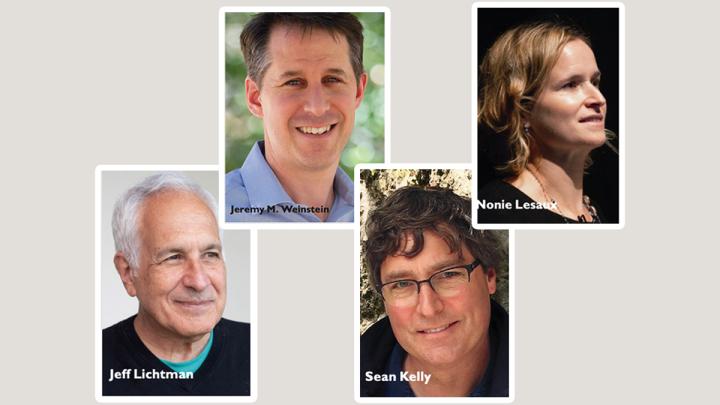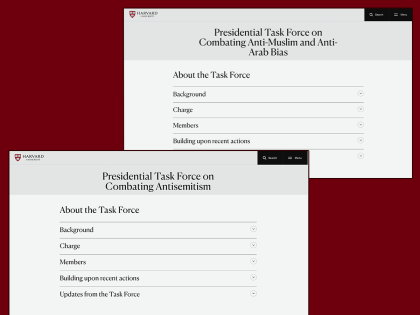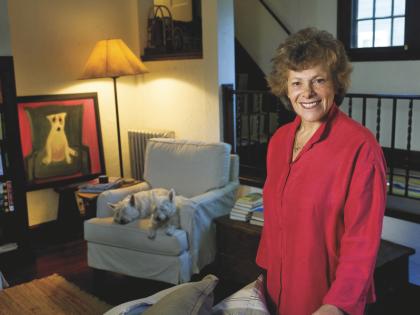A Deluge of Deans
Several significant leadership appointments were announced toward the end of the spring semester. Jeremy M. Weinstein, Ph.D. ’03, professor of international studies at Stanford, his academic home for two decades, will become Harvard Kennedy School dean on July 1, succeeding Douglas W. Elmendorf. Weinstein studies comparative politics and public policy, with interest in civil wars, political violence, ethnic politics, democracy, political change, and the political economy of development. He has written books on subjects such as violent insurgency and, most recently, the intersection of technology and democracy (System Error: Where Big Tech Went Wrong and How We Can Reboot). Weinstein co-directed Stanford’s Immigration Policy Lab, which helps refugees, asylum seekers, and immigrants by partnering with govern- ments and nonprofits, as well as designing and evaluating policy. He also helped launch Stanford Impact Labs, which supports researchers who work with government and business leaders to address social problems. Read more at harvardmag.com/kennedy-announced-24.
Separately, as the search for a permanent successor to Bridget Terry Long begins, Larsen professor of education and human development Nonie Lesaux begins serving as interim dean of the Graduate School of Education on July 1. The school’s former academic dean, Lesaux is an expert on youth literacy; learn more at harvardmag.com/interim-ed-24. Finally, in the Faculty of Arts and Sciences, Dean Hopi Hoekstra filled out her leadership team, appointing suc- cessors to two divisional deans who relinquished their responsibilities at the end of the academic year. Martignetti professor of philosophy Sean Kelly will lead the arts and humanities (see harvardmag.com/kelly-dean-24). Jeff Lichtman, a neuroscientist who is Knowlesprofessor of molecular and cellular biology and Cajal professor of arts and sciences, will direct the sciences (see harvardmag.com/lichtman-dean-24)
Arts Impresario
Jack Megan, director of Harvard’s Office for the Arts—celebrating its fiftieth year—concludes 23 years of service as he retires on June 30. Saluting him during the Arts First festival in April, interim president Alan M. Garber hailed Megan as “someone whose generosity of time and talent has shaped and altered forever the lives of countless students at Harvard.” Under his leadership, the OFA expanded its public art and performance programming significantly, added fellowship opportunities, opened a new ceramics studio facility, and renovated the Farkas Hall stage. Nearly 40 percent of Harvard’s 7,000 undergraduates now participate in arts programming through the OFA each year. Read a comprehensive report on Megan’s impact and the OFA’s plans for the future at harvardmag.com/chapter-arts-24. In an effusive tribute at the May 7 Faculty of Arts and Sciences meeting, Harvard College Dean Rakesh Khurana hailed Megan as “a mentor, a confidant, and a guide to every dean and president fortunate enough to work alongside him since his arrival,” observing that “in his speech, action, and manner, in Commencement, Convocation, Arts First, presidential inaugurations, and countless student productions, Jack has sought to cultivate belonging and common life through the arts.”
Stellar Scientists
Eight faculty members have been elected fellows of the American Association for the Advancement of Science: Martha Bulyk, professor of pathology and of medicine; Howard Georgi, Mallinckrodt professor of physics; Rohit N. Kulkarni, professor of medicine; Soumya Raychaudhuri, professor of medicine and of biomedical informatics; Kevin Staley, Kennedy professor of child neurology and mental retardation; Ramnik Xavier, Isselbacher professor of medicine in the field of gastroenterology; Jatin Vyas, associate professor of medicine; and Yingzi Yang, professor of developmental biology.
Overseers Executives
Vivian Hunt ’89, M.B.A. ’95, chief innovation officer of UnitedHealth Group’s Optum unit, has been elected president of the Board of Overseers for the 2024-2025 academic year, and Tyler Jacks ’83, a cancer geneticist and MIT professor, will serve as vice chair of the executive committee. They succeed Max Hodges ’03, M.B.A. ’10, and Geraldine Acuña-Sunshine ’92, M.P.P. ’96. Hunt and Jacks may have an interesting year, if the Corporation initiates a search for a regular successor to former President Claudine Gay and Alan Garber, the interim president. In past searches, the Overseers’ leaders have joined the search committee—and the Corporation itself will have a recently appointed and a brand-new member as of July 1 (see harvardmag.com/frazier-bae-24). Newly elected Overseers are listed on page 25.
SAT Redux, and Admissions Matters
Harvard College announced on April 11 that it will reinstitute mandatory submission of standardized test scores for applicants, beginning in the fall 2024-spring 2025 admission season for entry into the class of 2029. The decision, following similar actions by Dartmouth, Yale, and Brown, ends Harvard’s pandemic-era move to a test-optional policy, which was originally slated to last through applicants to the class of 2030. (Read more about the logic at harvardmag.com/tests-reinstated-24.) Cornell and Caltech followed suit. Penn and Princeton maintain temporary test-optional applications, and Columbia has said it will remain so “indefinitely.” Separately, issues such as legacy preferences remain under debate; Connecticut’s legislature, which proposed banning the practice (as Maryland has done), subsequently moved to requiring schools to report data on legacy admissions. Read more at “Admissions Evolving” (May-June, page 19).
Sustainability Update
Harvard Management Company’s annual report on progress toward its 2050 “net-zero” greenhouse gas emissions goal, released March 28, reveals that investments in climate-transition technologies and enterprises now exceed 1 percent of endowment assets, and that exposure to fossil fuel holdings total less than 2 percent of assets. Accordingly, “the endowment’s exposure to climate transition solutions is on pace to exceed those in fossil-fuel investments,” in a runoff mode, “in the next few years.” Further details are available at harvardmag.com/year-four-24.
Esteemed Teacher-Scholars
At the May 7 Faculty of Arts and Sciences meeting, Dean Hopi Hoekstra conferred numerous awards for outstanding teaching, advising, mentoring, and scholarship. The most prestigious FAS awards for undergraduate teaching are five-year Harvard College Professorships. This year’s honorands are Selim Berker, Alford professor of natural religion, moral philosophy, and civil policy; Ya-Chieh Hsu, professor of stem cell and regenerative biology; Jie Li, professor of East Asian languages and civilizations; Matthew Liebmann, Peabody professor of American archaeology and ethnology; and Yue M. Lu, McKay professor of electrical engineering and of applied mathematics. A complete list of the worthy recipients appears at the end of the report on the meeting, published at harvardmag.com/fas-task-24.
Guggenheim Honorands
Winners of Guggenheim Fellowships for their research next academic year include Kosuke Imai, professor of government and of statistics; Tiya Miles, Garvey professor of history; Tracy K. Smith, professor of English and of African and African American studies; Carola Suárez-Orozco, professor in residence at the Graduate School of Education and the director of the Immigration Initiative at Harvard; and James Wood, professor of the practice of literary criticism.
Allston Ambitions
With construction underway at the commercial enterprise research campus in Allston (see “Dirt Flies,” May-June, page 15), Tishman Speyer, the developer, has taken the initial step toward developing an adjacent, second phase of the project: 720,000 square feet of additional laboratory and office space, and 320,000 square feet of residential facilities, on 4.8 acres. See the details at harvardmag.com/allston-research-24.
What They Made
The University’s annual tax filings, which cover the fiscal year ended June 30, 2023, reveal that President Lawrence S. Bacow earned $1,333,866 plus other compensation of $423,243 (principally the value of the University-provided official residence, Elmwood). Harvard Management Company’s CEO, N. P. Narvekar, was awarded salary and incentive compensation of $6.19 million for calendar 2022 (and was paid $9,602,531 in total that year, including deferred compensation earned in prior periods). Details about other Harvard administrators’ compensation may be found at harvardmag.com/salaries-announced-24.
Radcliffe Roster
One-quarter of the Radcliffe Institute’s 52 fellows in the 2024-2025 academic year (its twenty-fifth anniversary class as an institute) are Harvard faculty members, including Sandra Susan Smith, Guggenheim professor of criminal justice; Tracy K. Smith, professor of English and of African and African American studies; and Lauren K. Williams, Robinson professor of mathematics. The fellows—who include scholars, journalists, writers, and playwrights—will pursue interdisciplinary work on subjects ranging from artificial intelligence to political philosophy to climate change. Learn more about the fellows and their projects at harvardmag.com/radcliffe-fellows-24.
Title IX Revisions
Revised regulations governing Title IX of the Education Amendments of 1972 (the law protecting students from sex-based discrimination) were released by the Biden administration in April, following more than two years of review. The changes from the Trump administration version extend protections to LGBTQ+ and pregnant students (a change likely to prompt fierce opposition in some quarters); permit, but no longer require, live hearings with the opportunity for cross-examination when cases are heard; and require colleges and universities to investigate allegations of impermissible conduct that occurs off-campus. The regulations also require institutions in most cases to apply the “preponderance of evidence” standard in evaluating cases and expand the definition of sexual harassment from behavior that is “severe, pervasive, and objectively offensive” to “unwelcome sex-based conduct” that is “subjectively and objectively offensive and is severe or pervasive”—liberalizing changes that may prompt the filing of more cases. University Title IX coordinator Nicole Merhill told the Harvard Gazette that although refinements to policies and procedures will be required to assure compliance with the new regulations, they represent “more of a slide and pivot” than a wholesale reversion to the pre-2020 standards.
Headlines
The Harvard Film Archive will be dark this summer as its lighting system is upgraded and associated electrical repairs are made; it is scheduled to be back in service in time for fall semester classes and screenings.…Henry Chu ’90, NF ’15, who for many years reported for the Los Angeles Times, has been appointed deputy curator of the Nieman Foundation for Journalism, filling a vacancy.…Jerry Murphy ’73, M.B.A. ’77, who has run the Harvard Coop since 1991, is stepping down in September, to be succeeded by Jodi Goldstein, M.B.A. ’96, a founder of the Harvard Innovation Labs. Learn more at harvardmag.com/coop-ceo-24.…And another Crimson-oriented enterprise, the Harvard University Employees Credit Union, operating under a new federal charter, has rebranded as the Harvard Federal Credit Union.…With the announcement that the Cambridge Queen’s Head Pub, in Loker Commons, will close, Harvard is getting out of the business of running a bar for undergraduates (of legal age); the social space is to be reconfigured for continued student use.…All in the (academic) family: Stanford has appointed economist Jonathan Levin, an alumnus who has most recently been dean of its business school, as its president. He is the son of Stanford alumnus Richard Levin, Yale president emeritus.…The Harvard Kennedy School’s Belfer Center for Science and International Affairs marked its fiftieth anniversary as a locus for research and policy discussion with a day-long conference on May 10, featuring center fellows and global leaders addressing China, Ukraine and European security, defense and technology, nuclear weaponry, energy, the Middle East, and other urgent concerns.…The Carnegie Corporation of New York awarded $200,000 fellowships to 28 scholars focusing on political polarization and strengthening democracy; Harvard recipients include Elizabeth McKenna, assistant professor of public policy, and Taeku Lee, Bae Family professor of government…The Kohli Foundation for Sociology has conferred its annual Kohli Prize, with a €50,000 honorarium, on Michèle Lamont, Goldman professor of European studies and professor of sociology and of African and African American studies, for her “scholarly work on boundaries, inequalities and social worth.”








